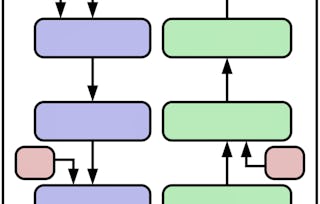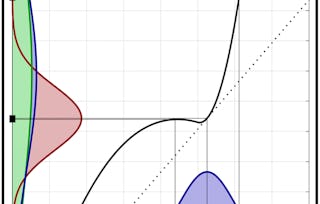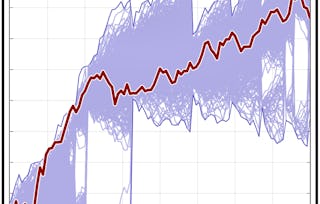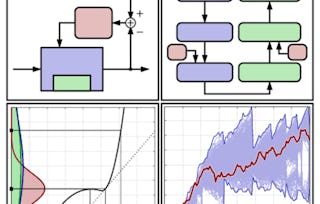Introduces the Kalman filter as a method that can solve problems related to estimating the hidden internal state of a dynamic system. Develops the background theoretical topics in state-space models and stochastic systems. Presents the steps of the linear Kalman filter and shows how to implement these steps in Octave code and how to evaluate the filter’s output.

Gain next-level skills with Coursera Plus for $199 (regularly $399). Save now.

Kalman Filter Boot Camp (and State Estimation)
This course is part of Applied Kalman Filtering Specialization

Instructor: Gregory Plett
2,938 already enrolled
Included with
(21 reviews)
Recommended experience
Skills you'll gain
Details to know

Add to your LinkedIn profile
28 assignments
See how employees at top companies are mastering in-demand skills

Build your subject-matter expertise
- Learn new concepts from industry experts
- Gain a foundational understanding of a subject or tool
- Develop job-relevant skills with hands-on projects
- Earn a shareable career certificate

There are 4 modules in this course
This week, you will learn what a Kalman filter is and generally what it does. You will be introduced to the roadmap for the course and the specialization, and will learn some applications that use Kalman filters.
What's included
6 videos11 readings6 assignments1 discussion prompt
Kalman filters estimate the "state" of a system that is described using a "state-space model." This week, you will learn the background concepts in state-space models that are required in order to implement a Kalman filter.
What's included
8 videos9 readings8 assignments2 ungraded labs
Systems whose state we would like to estimate are affected by unknown inputs ("disturbances" or "process noises") and their measurements are affected by sensor noises. These noises are modeled by random variables. This week, you will learn the background concepts in random variables that are required in order to implement a Kalman filter.
What's included
8 videos8 readings8 assignments1 ungraded lab
Even though we have not yet derived the steps of the Kalman filter, it is instructive to gain insight into a Kalman filter's operation by watching it run. This week, you will learn how to implement a Kalman filter in Octave and see cases where it works well and where it fails (next course, you will learn why!).
What's included
6 videos6 readings6 assignments4 ungraded labs
Earn a career certificate
Add this credential to your LinkedIn profile, resume, or CV. Share it on social media and in your performance review.
Instructor

Offered by
Explore more from Electrical Engineering
 Status: Free Trial
Status: Free TrialUniversity of Colorado System
 Status: Free Trial
Status: Free TrialUniversity of Colorado System
 Status: Free Trial
Status: Free TrialUniversity of Colorado System
 Status: Free Trial
Status: Free TrialUniversity of Colorado System
Why people choose Coursera for their career




Learner reviews
21 reviews
- 5 stars
90.47%
- 4 stars
9.52%
- 3 stars
0%
- 2 stars
0%
- 1 star
0%
Showing 3 of 21
Reviewed on Mar 29, 2025
Outstanding introduction to Kalman Filtering. A very well designed course. Thanks to Professor Platt.

Open new doors with Coursera Plus
Unlimited access to 10,000+ world-class courses, hands-on projects, and job-ready certificate programs - all included in your subscription
Advance your career with an online degree
Earn a degree from world-class universities - 100% online
Join over 3,400 global companies that choose Coursera for Business
Upskill your employees to excel in the digital economy
Frequently asked questions
To access the course materials, assignments and to earn a Certificate, you will need to purchase the Certificate experience when you enroll in a course. You can try a Free Trial instead, or apply for Financial Aid. The course may offer 'Full Course, No Certificate' instead. This option lets you see all course materials, submit required assessments, and get a final grade. This also means that you will not be able to purchase a Certificate experience.
When you enroll in the course, you get access to all of the courses in the Specialization, and you earn a certificate when you complete the work. Your electronic Certificate will be added to your Accomplishments page - from there, you can print your Certificate or add it to your LinkedIn profile.
Yes. In select learning programs, you can apply for financial aid or a scholarship if you can’t afford the enrollment fee. If fin aid or scholarship is available for your learning program selection, you’ll find a link to apply on the description page.
More questions
Financial aid available,

